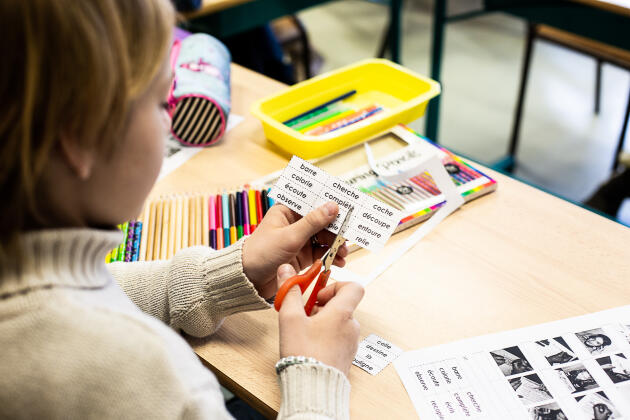ReportageIn Avallon, Dijon and Strasbourg, children and teenagers arriving from Ukraine are beginning to find their bearings in class. Educational units for newly arrived allophone pupils, placed under the spotlight with the influx, in one month, of some 9,000 young people of school age, are put to use, in different forms depending on the contexts and ages.
–
A class where the students are constantly talking, babbling, laughing as they move almost freely from the small desks to the blackboard… and vice versa: this is the atmosphere in which one plunges when pushing open the door of Catherine Darenne’s room, on the first floor of the small Victor-Hugo elementary school in Avallon (Yonne).
Facing her, this Tuesday, April 5, four children give voice. Martin, 11, his sister Lilia, 8, and twins Vlada and Valeria, also 8, speak Ukrainian non-stop, integrating a few English phrases into their exchanges. And a few words – their first – in French: “I’m fine”, “I’m reading”, “to taste it”. The two siblings arrived from Ukraine with their respective families at the beginning of March and joined, in this city of 6,500 inhabitants, around fifty other refugees who had left from kyiv or Kharkiv to escape the bombs.
“Going from kyiv to Avallon, and put down your suitcases in the middle of the Morvan regional park, it must be something, at the height of a child”, breathes the director of the school, Arnaud Duplessis, who has integrated the four “new” to his hundred students three weeks ago. The boy was enrolled in CM2, the girls in CE2, but they leave their respective classes, two mornings a week, to work in small groups with Catherine Darenne.
“A role of cocoon”
Of the exodus, of everything that happened ” before “, the teaching staff knows very little. She’s not looking for “necessarily” to know. “Faced with uprooting and trauma, the school can act as a cocoon, a parenthesis for the child, argues Ariane Ourry, CM2 teacher. The beginning of a return to normal. »

Catherine Darenne has spotted, in the exchanges between children, the words « Putin » and «Ukraine», and “faces that sometimes freeze”, sign of a « certain stress ». But, in thirty years of career, she has learned to manage it: she carries in her constituency, among other things “caps”, that of referent of the academic center for the education of allophone children (whose mother tongue is not French) which tests and assigns new arrivals according to their level and their place of accommodation. Who in educational units for incoming allophone students (UPE2A) located in elementary schools, colleges and high schools; which in more flexible systems, such as that of Avallon, where individualized care evolves according to needs.
You have 83.26% of this article left to read. The following is for subscribers only.
–

